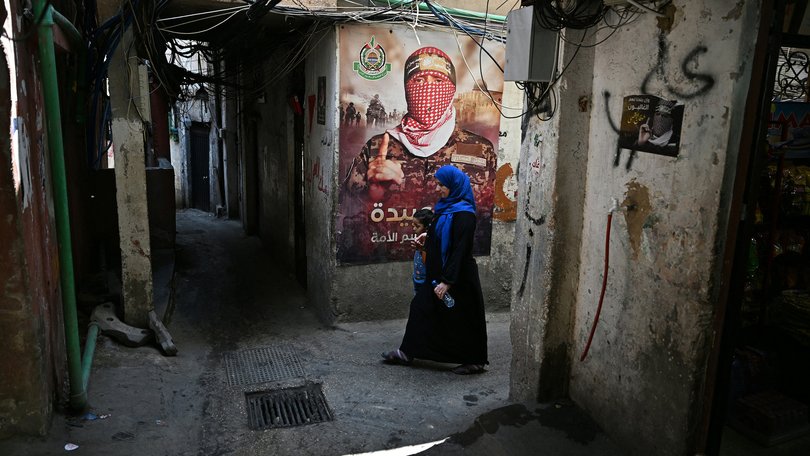THE WASHINGTON POST: Israel says it has killed, Abu Obaida, the spokesman of Hamas’s military wing
THE WASHINGTON POST: An Israeli strike in Gaza City has killed the longtime spokesman of Hamas’s armed wing.

An Israeli strike in Gaza City killed the longtime spokesman of Hamas’s armed wing, Israel’s military said Sunday, landing a symbolic but potentially important blow against what remains of the group’s leadership, as Israeli troops close in on Gaza’s largest metropolis.
The strike was carried out Saturday in the Rimal neighborhood of Gaza City and targeted the man known as Abu Obaida, his nom de guerre. Hamas condemned the strike but did not say whether the spokesman was killed. A senior Hamas official did not respond Sunday to a request for comment.
In a statement, the Israel Defense Forces and Shin Beit intelligence agency said that Abu Obaida, whose real name is Hudhayfa al-Kahlout, led the “propaganda and psychological terror campaigns” of Hamas’s armed wing, the Izzedine al-Qassam Brigades. For almost two decades, he was the face of Hamas’s military operations, appearing regularly in videos and at news conferences in fatigues and his trademark red kaffiyeh, wrapped around his face to conceal his identity.
Sign up to The Nightly's newsletters.
Get the first look at the digital newspaper, curated daily stories and breaking headlines delivered to your inbox.
By continuing you agree to our Terms and Privacy Policy.His unit oversaw the distribution of footage from the Oct. 7, 2023, attacks, according to the military, and was responsible for producing and releasing videos of Israeli hostages in Gaza.
Over the years, as he briefed audiences through multiple conflicts, Abu Obaida’s profile grew not only in Gaza but across the Arab world.
“Abu Obaida’s persona carries great weight in the Palestinian, Arab, and Islamic consciousness,” said Ibrahim al-Madhoun, a Turkey-based analyst and writer who is close to Hamas.
“He is not merely an individual, but an entire institution,” he added, saying that if Abu Obaida’s death is confirmed, “we will be facing a pivotal and difficult phase.”
His last message before the strike was released Friday, when he said Israel’s plans to capture Gaza City would endanger the hostages. “Every hostage killed in airstrikes will be named and shown in photographs,” he said. Fewer than 50 hostages remain in Gaza, 20 of whom are presumed to be alive.
Earlier in the conflict, as Israel retaliated for the Oct. 7 attacks, Abu Obaida had threatened to execute civilian hostages. The warning was included in an announcement from the Treasury Department when it imposed sanctions on Abu Obaida last year. The statement also said he was involved in procuring servers and domains in Iran to host Hamas’s website.
“I hope he is no longer with us,” Israeli Prime Minister Benjamin Netanyahu said of Abu Obaida at the beginning of Sunday’s cabinet meeting. “But I notice there is no one to speak on Hamas’s behalf about this matter.”
Israel has decimated much of Hamas’s leadership, including military commanders and the group’s onetime political chief, Ismail Haniyeh, who was assassinated in 2024 while visiting Tehran.
The IDF chief of staff, Eyal Zamir, mentioned the strike on Abu Obaida and said Sunday that “most of Hamas’s leadership has already been eliminated.”
But, he said, “Our actions are not yet complete. Most of the remaining Hamas leadership is abroad, and we will reach them as well.”
Zamir has been outwardly critical of Netanyahu’s plans to conquer Gaza City, and in recent weeks has publicly warned that the prime minister and his government should agree to a deal to release the remaining hostages.
Netanyahu met with his security cabinet Sunday to discuss the operation to retake Gaza City, Israel’s public broadcaster reported. Humanitarian organizations have said that such an offensive would cause untold harm to civilians in Gaza, forcing them into another round of mass displacement as more than half a million people are gripped by famine.
Over the weekend, the head of the International Committee of the Red Cross called Israel’s push for the evacuation of Gaza City “incomprehensible under the present circumstances.”
“Such an evacuation would trigger a massive population movement that no area in the Gaza Strip can absorb,” ICRC President Mirjana Spoljaric said.
© 2025 , The Washington Post
